- Home
- Gregory Maguire
Hiddensee
Hiddensee Read online
Dedication
For Barbara Harrison
In honor of her love for Greece, our homeland
Epigraph
I will remind the reader that the perplexities into which the poor old gods fell at the time of the final triumph of Christendom . . . offer striking analogies to former sorrowful events in their god-lives; for they found themselves. . . . compelled to flee ignominiously and conceal themselves under various disguises on earth. . . . several, whose shrines had been confiscated, became wood-choppers and day-laborers in Germany.
—Heinrich Heine, “Gods in Exile”
For some reason, we know not what, his childhood . . . lodged in him whole and entire. He could not disperse it. And therefore, as he grew older, this impediment at the center of his being, this hard block of pure childhood, starved the mature man of nourishment. . . . But since childhood remained in him entire, he could do what no one else has ever been able to do—he could return to that world; he could recreate it, so that we too become children again.
—Virginia Woolf, “Lewis Carroll,” in The Moment and Other Essays
Most of the ancient groves are gone, sacred to Kuan Yin
And Artemis, sacred to the gods and goddesses
In every picture book the child is apt to read.
—Robert Hass, “State of the Planet”
do you know what it’s like to live
someplace that loves you back?
—Danez Smith, “summer, somewhere”
Contents
Cover
Title Page
Dedication
Epigraph
Part One A Household Tale
A Posthumous Education
Bildungsroman
The Padlocked Garden
Part Two Intermezzo
Part Three The Story of the Nutcracker and the Mouse King
Coda Hiddensee
Acknowledgments
About the Author
Also by Gregory Maguire
Copyright
About the Publisher
Part One
A Household Tale
1.
Once there was a boy who lived in a cabin in the deep woods with no one for company but an old woman and an old man.
In the goat shed one day, the old woman said, “Watch and you’ll see where life comes from.”
The boy looked where she was pointing. With an expression of disgust and boredom, a cat pulsed a sac from between her hind legs. The mother cat chewed the silvery slipcase, unwrapping her kitten. It twitched and lay there, as exhausted as if it had swum its way to shore. “Was I so damp and furry when I arrived?” asked the boy. He was still very young.
“I’ve told you a dozen times. You’re a foundling, Dirk. You didn’t grow inside me. We collected you in a basket.”
“What kind of basket?” This was the only question he could think of.
She ignored that. “In those days, you could hardly go into the woods for mushrooms or acorns without tripping over some abandoned brat. A nuisance, to be sure.”
“Don’t put folly in the boy’s head,” said the old man.
The boy had gone back to watching the mother cat. She licked the transparent webbing into ribbons. Another kitten emerged from her. A third. They stretched and settled. One of them turned its head toward Dirk. Its eyes were closed. “Hello,” said Dirk. “Where did you come from?” He was still young enough, back then, to expect it would answer.
The kitten opened its mouth, but the old man said, “Come away and give them some privacy. It’s cruel to scare them so early in their lives.”
So Dirk never learned what the kitten had been about to reply.
The old woman. Here’s what she was like. Her face was scored with lines from working outside in all weathers. She wore dull clothes in colors that had forgotten to be colorful. It didn’t matter, she hadn’t much to celebrate by way of looks. Her nervous eyes were bulbous, her lips dry and inclined to pursing. When she hitched up her skirts to wash her calves once a month, however, her lower legs and ankles were smooth and pretty. Dirk always found this confounding. “One day you’ll be too old to watch me wash myself,” she said. “Towel.”
Was she loving or was she harsh? Dirk didn’t know. A child who lives in a hut in the forest can’t answer such a question. She was as she was, the way the wild boar is a wild boar, or the butterfly a butterfly. She thinned her ale with spring water. She cooked almost enough for supper every night. Quite often her bread refused to rise. Her family ate it anyway, and gave thanks—a thanks both rueful and brief.
“If we lived nearer the village, you could send me for baked bread,” Dirk told her.
“You’re too young. When you’re older, Papi will show you the way. But mind me, if you ever set out on your own, you’ll get lost. It’ll be up to you to find yourself. We won’t come looking for you.”
But you already found me, he wanted to reply.
“He’s not going off,” said Papi. “Don’t put notions into his head.”
“What head is that?” she replied, cuffing Dirk above the ear, but affectionately.
So next, Papi.
He was old, too; he was the old man to her old woman. His pathetic beard was the brown of iced mud. Dirk didn’t know if the old man had been born with that hunched shoulder or if the ailment had come from years carrying an axe.
He was a woodcutter. He maintained four cutting stations some distance away in the deep forest, one in each direction from the lonely waldhütte where they lived. Upon a tree at each station he’d hammered a wooden box. Beneath the box he left trimmed logs and stacked kindling. If passersby wanted tinder for their ovens or hearths, they could take what they needed and, in exchange, drop some coins in the box. Sometimes they took more than they paid for. Sometimes the portion they got was a little greener than would be useful. It evened out.
The old man was spare of speech. When he opened his mouth it was often to contradict the old woman. He might have been cross by nature or maybe his lumpy shoulder gave him bother. He didn’t like to wring the neck of a barnyard chicken when one was needed for the pot. He made the old woman do that job. But once during a hard winter, when a rogue wolf came prowling, he managed to trap it and kill it with his axe.
The wolf bled to death under the moon. In the morning, the old woman broke off a portion of frozen blood. It was like a cracked brown plate. She brought it home to thicken the evening stew.
“Papi, get out the carving knife if we’re to have sausage meat from that hairy old sinner,” she said.
“I’d rather drag the carcass to the village and sell it, and buy something already minced and spiced,” he replied.
“No one would give a pfennig or a ham bone for that mangy creature. You are a coward still. I’ll butcher the beast myself if you won’t.”
“Let me come with you to the village, Papi,” said Dirk.
“No one’s going to the village,” shouted the old woman. She named the rules. “Nobody here knows where it is.” That was a regular lie to make Dirk shut up—they all knew that the old man went for provisions every now and then.
The old woman hung the wolf by its back legs so it could finish bleeding into a bucket. The chickens and the barn cat and the cow didn’t seem to mind.
As the dead beast twisted on its truss, sometimes the upside-down head turned toward Dirk, who sat on the milking stool and watched. The eyes had grown filmy and red. Some flies that wintered in the barn crawled upon the wolf’s snout, but the corpse eyes didn’t blink. What are you seeing behind that calm red death, wondered Dirk. Where are you now that you aren’t bothered by the twitching of flies?
Dirk. The old man and the old woman. Birth and death. Birth and death and the woods all around. And questions that
never got answered, because they couldn’t easily be asked.
2.
You might be expecting to hear something about Dirk himself now. But what is there to say?
He was a boy who was short when he was younger but grew a little bit each year. He had a hand at the end of each arm, and above his nose, two eyes spaced evenly enough apart not to be upsetting. If he was outside, his hair color changed from dusty wheat in the summer noontimes to red-gold in sunset light. When inside, his hair was more brown, like an old master sketch done in Conté crayon. His incidental smile, if it broke through, was pleasing because it was rare. He smelled like dirty clothes when his clothes were dirty. On bathing day he smelled like raw boy.
He didn’t look like the old woman or the old man, not only because he was a foundling, but for that other, obvious reason: When does a boy ever really look like an adult until he gets there?
If he gets there.
The old man taught him his catechism and his letters. The old woman taught him how every soup begins with an onion. The old man showed him how to carve a potato, and said one day he might get a knife of his own that could carve wood, but not today.
In the long, dark winter evenings, while the old man shaped animals and other figures from knots of pine, the old woman told Dirk stories.
This made the old man impatient. “It’s a sin to tell a lie,” he said.
“Another sin to deny the truth,” she replied.
The stories involved princesses and disguises, castles and enchantments, third sons out to make their way in the world, ancient witches, cunning magicians, animal patrons and guides. Almost all of the stories started with the death of a mother in childbirth. “Is that how my mother died?” he asked the old woman one night.
The old man went out of the waldhütte and slammed the door, even though frost was in the air.
“No one knows his own story, and that’s the way of it, unless you make it up yourself,” she said at last. “Now, that girl in the red cape; there’s a wolf coming along. Just like the one we made sausage out of. Listen to what happens next.”
He listened.
And all this was in 1808, or so, in Bavaria.
3.
When Dirk had grown about as tall as a broom handle, he awoke one night to the sound of muttering below. He rolled on his pallet of straw in the loft and put his ear to a crack in the boards. The old man was fighting with the old woman. Dirk picked out a few words—“necessary”—“feeble”—“scarcity.” Whispering can disguise the shape of syllables, but not of mood. Dirk heard fear, and blaming.
It reminded him of something. But of what did he have experience but this hut in the shrouded forest, these two elderly keepers? Only the occasional Bible story that Papi read slowly by firelight. Elijah in disguise, Isaac and Abraham. Or the tales that the old woman told, of the goose that laid the golden eggs, of the twelve brothers turned into swans. The stepmother who stewed her children and served them to her husband for supper.
A thin catalog by which to reference human charity and suffering.
The old woman’s sniveling gave way at last to an aching silence. None of the old man’s heavy snoring, which meant he was lying awake uncomforted, staring into the dark.
In the morning, the old man said, “Dirk, today I will take you into the forest and teach you to fell a tree. It is time . . .”
He did not say what it was time for.
Dirk had always wanted to go with the old man and learn his skill. The old woman had always forbidden it. Today she turned to the iron pot over the hearth and said nothing, neither blessing the day’s plan nor prohibiting it.
Before they left, she wrapped bread and cheese in a muslin and pressed it into Dirk’s hands. “Mind your way forward and find your way back,” she said to them once they were over the threshold and through the gate. Did her voice quaver because her little foundling was growing up? Dirk glanced back. She was not there waving. The door was shut.
4.
They walked in silence for what seemed like half the morning.
For a while the branches of pines were low with wet. It was a day in autumn. One of those bridging days between brightness and gloom, though which direction it was headed—which direction Dirk was headed, gloom or brightness—was unclear.
He followed the old man, keeping his eyes on the axe head swaying behind the old man’s shoulder.
The boy was still wondering of what the argument last night reminded him.
Once, according to rumor, Napoleon’s armies had come nearby. On their way to the Battle of Ulm, perhaps. Or the French emperor was said personally to be driving his men forward to Russia. The old man and the woman were unclear on the specifics, but they fretted how best to stay out of the way. To the boy’s regret, no stray infantry battalion came anywhere near them. No runaway soldier, not even a lost bugle boy. Still the old man and the old woman had argued about danger. Fearing conscription, the old man had huddled close to home. The axe, holidaying in the shed, had grown a cobweb beard.
Or perhaps Dirk was only remembering the old woman’s stories. In her repertoire, starving parents abandoned their children in the woods with shocking frequency.
Dirk didn’t want to be sold to an army or left alone in the woods. He didn’t know if the old man would think of such things. Perhaps last night’s discussion had only been about whether Dirk was old enough to swing an axe. He was still young. But not as young as he had been.
They came to an upland stand of trees, very dark and dense though a canopy of yellow foliage crowned their heads. From stout trunks, muscled limbs split into elbows, forearms, and fingers. No sound of bird chatter here, or the chitter of insects, either. Not even the tidal sweep of wind in leaves.
“If we are here, we are here,” said the old man. “Now I will show you a blow so great you won’t soon forget it. Stand there, and don’t move.”
Dirk did as he was bid.
The old man unshouldered the axe. He held it in front of himself with two hands. “Here is how you hold the axe. Imagine the handle is divided into three equal portions, like three sausages the same size. Place your right hand here, and turn it so. Your left hand otherwise. Do you see? How well you hold the axe determines your swing and the force of your blow. You can do a lot of damage with a good blow.”
Dirk tried to understand.
The old man said, “First we clear the lower limbs. This helps us to see higher, and determine the best direction for the tree to drop. This tree here, it is not so old. A young but sturdy specimen. We will start with this.”
With swift strikes and loud, the old man trimmed the lowest branches. Soon all that was left below was a pole of a trunk, bleeding sap. Above, a heaviness of leaves still clouded the sky, though some had been shaken off under the assault.
The old man wiped sweat off his forehead. His eyes were wide. More to himself than to the boy, he said, “A cruel truth: Life demands death.”
“Now will you show me how?”
“There’s making and there’s killing. I never brought down a tree but that I snapped a small limb of it to carve into a figure. You kill and you make. What will I make of you?”
The boy took a step back. “But it’s my turn now.”
“I can’t,” said the old man, “I must.” He turned all around in a circle, as if the boy might be gone when the old man faced forward again. Dirk waited.
“Papi, let me try.”
“Where’s the harm there? The moment is now or it comes in a moment, almost the same thing.” He handed the axe to Dirk. “I need to catch my breath and my nerve. You might as well have a hand at it.”
They exchanged places. Dirk picked up the axe. He knew how heavy it was, because he’d often shifted it around the woodshed. Still, he’d never hoisted it chest-height before. He staggered under its weight.
“Don’t imagine you’ll slay the tree in one stroke,” said the old man. “The first strike is just to make a mark. Swing at an angle from shoulder-height to
waist. Gravity will add force to how you land the blow. Keep your grip firm at impact or you’ll lose control. You’ll have calluses in two minutes, but then, they won’t trouble you for long.”
He stood, that old man, one hand in the pocket of his jerkin, fingering his beads, the other raking his beard in a contemplative gesture.
Dirk tried to fashion his stance as the old man had stood. Left foot forward, right leg back and braced. The wood held its breath.
Making or killing. What an argument to have.
He swung. The axe head wavered in a half-circle around Dirk, but it picked up speed. As it came near to burying itself in the tree trunk—or to glancing off it, more likely—something twitched at the roots of the tree. As if the tree were flinching. It was a mouse with six baby mice along her flanks.
The mother mouse looked up at Dirk. The baby mice all tucked their heads under her legs and belly. As Dirk veered, the axe head wobbled, and the whole tool flew out of his grasp. The axe drove itself in the old man’s leg just below the knee.
5.
An unholy aria of muffled wailing and laughing from the old man. Dirk could hardly make out the words. “You bloody moron, and who can blame you,” the old man said, as far as Dirk could tell. “Oh, owww, a pox on you.” The axe fell out of his leg to the ground. Beneath the torn legging, a flap of hairy shin turned slick with blood. “Your scarf, boy, before I bleed to death.”
Dirk handed over the muffler. Wincing and cursing, the old man tightened a tourniquet just below the knee. “Did you mean to kill me?”
Dirk couldn’t speak. The blood was luscious until it matted the cloth, then it turned the color of dirt. “I’ll kill that axe,” the boy finally said.

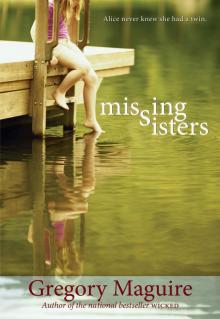 Missing Sisters
Missing Sisters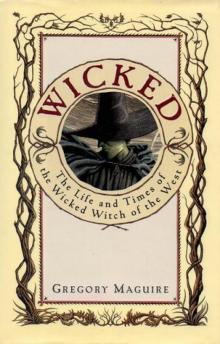 Wicked: The Life and Times of the Wicked Witch of the West
Wicked: The Life and Times of the Wicked Witch of the West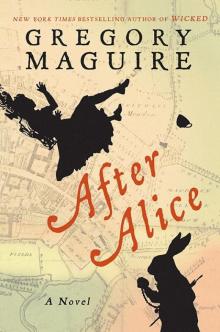 After Alice
After Alice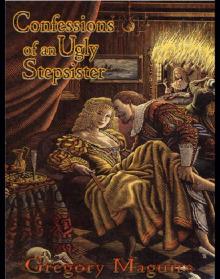 Confessions of an Ugly Stepsister
Confessions of an Ugly Stepsister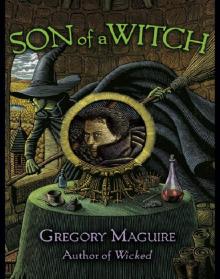 Son of a Witch
Son of a Witch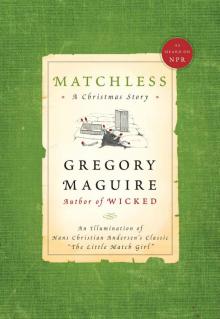 Matchless
Matchless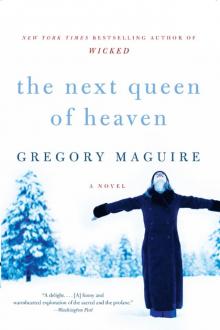 The Next Queen of Heaven
The Next Queen of Heaven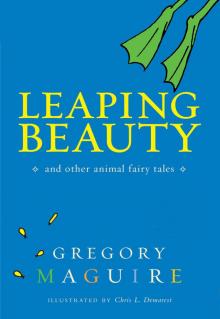 Leaping Beauty: And Other Animal Fairy Tales
Leaping Beauty: And Other Animal Fairy Tales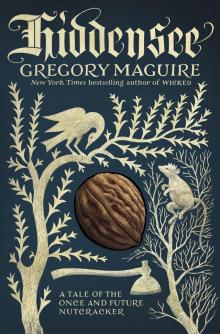 Hiddensee: A Tale of the Once and Future Nutcracker
Hiddensee: A Tale of the Once and Future Nutcracker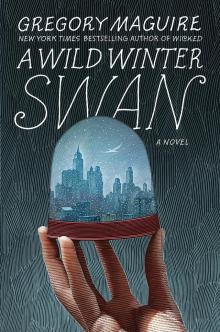 A Wild Winter Swan
A Wild Winter Swan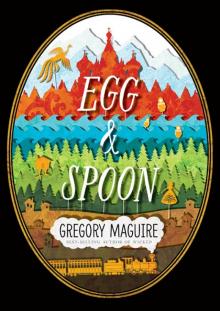 Egg & Spoon
Egg & Spoon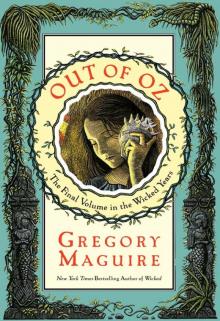 Out of Oz
Out of Oz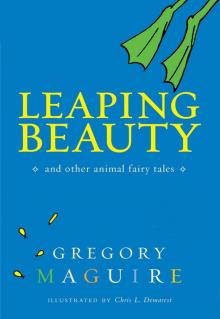 Leaping Beauty
Leaping Beauty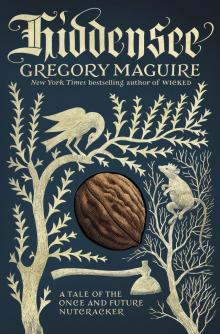 Hiddensee
Hiddensee The Wicked Years Complete Collection
The Wicked Years Complete Collection The Next Queen of Heaven: A Novel
The Next Queen of Heaven: A Novel